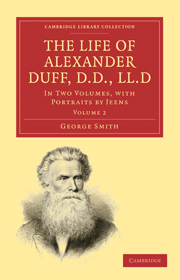Book contents
- Frontmatter
- Contents
- CHAPTER XVI MISSIONARY OF THE FREE CHURCH OF SCOTLAND
- CHAPTER XVII CONTINUITY OF THE WORK
- CHAPTER XVIII LORD HARDINGE'S ADMINISTRATION. — “THE CALCUTTA REVIEW”
- CHAPTER XIX DEATH OF DR. CHALMERS.—TOUR THROUGH SOUTH INDIA.—HOME BY THE GANGES AND INDUS
- CHAPTER XX DR. DUFF ORGANIZING AGAIN
- CHAPTER XXI MODERATOR OF THE GENERAL ASSEMBLY.—BEFORE THE HOUSE OF LORDS' INDIA COMMITTEE
- CHAPTER XXII IN AMERICA AND CANADA.—SECOND FAREWELL TO CHRISTENDOM
- CHAPTER XXIII THE MUTINY AXD THE NATIVE CHURCH OF INDIA
- CHAPTER XXIV LAST YEARS IN INDIA
- CHAPTER XXV IN SOUTH-EAST AFRICA.—THE MISSIONARY PROPAGANDA
- CHAPTER XXVI NEW MISSIONS AND THE RESULTS OF HALF A CENTUUY'S WORK
- CHAPTER XXVII DR. DUFF AT HOME
- CHAPTER XXVIII PEACEMAKING
- CHAPTER XXIX DYING
- INDEX
- Plate section
CHAPTER XX - DR. DUFF ORGANIZING AGAIN
Published online by Cambridge University Press: 05 July 2011
- Frontmatter
- Contents
- CHAPTER XVI MISSIONARY OF THE FREE CHURCH OF SCOTLAND
- CHAPTER XVII CONTINUITY OF THE WORK
- CHAPTER XVIII LORD HARDINGE'S ADMINISTRATION. — “THE CALCUTTA REVIEW”
- CHAPTER XIX DEATH OF DR. CHALMERS.—TOUR THROUGH SOUTH INDIA.—HOME BY THE GANGES AND INDUS
- CHAPTER XX DR. DUFF ORGANIZING AGAIN
- CHAPTER XXI MODERATOR OF THE GENERAL ASSEMBLY.—BEFORE THE HOUSE OF LORDS' INDIA COMMITTEE
- CHAPTER XXII IN AMERICA AND CANADA.—SECOND FAREWELL TO CHRISTENDOM
- CHAPTER XXIII THE MUTINY AXD THE NATIVE CHURCH OF INDIA
- CHAPTER XXIV LAST YEARS IN INDIA
- CHAPTER XXV IN SOUTH-EAST AFRICA.—THE MISSIONARY PROPAGANDA
- CHAPTER XXVI NEW MISSIONS AND THE RESULTS OF HALF A CENTUUY'S WORK
- CHAPTER XXVII DR. DUFF AT HOME
- CHAPTER XXVIII PEACEMAKING
- CHAPTER XXIX DYING
- INDEX
- Plate section
Summary
Dr. Duff found that he had returned to Scotland not a day too soon. There was urgently wanted for the Foreign Missions of the Free Church a financier in the best sense, one who could create a revenue self-sustaining and self-developing, as well as control expenditure so as to make it produce the best possible results. The financial management of religious and philanthropic organizations has been too often marked by the ignorance of mere enthusiasm on the one side, or the selfishness of dead corporations on the other. The men who have made the missionary enterprise of the English speaking races one of the most remarkable features of the century's progress since the French Revolution, have not always allowed economic law to guide them in their pursuit of that which is the loftiest of all ideals just because the Spirit of Christ has made it the surest of of of realities. It is a lesson to all philanthropic agencies, that he who was the most spiritual of men and most fervid of missionaries, with a Celtic intensity of fervour, was at the same time most practical as an economist and far-sighted as an administrator. He had shown this in the establishment of his first school and college in Calcutta; he had proved it in his first home campaign of 1835–39, to which Dr. Chalmers had publicly acknowledged his indebtedness. Of both, all the material fruit, in subscriptions, legacies, buildings and capital endowments had been at once surrendered to the Established Church, when the civil authority decided in 1842–as it vainly reversed the decision in 1874–that the ‘residuaries’ legally formed the Church of Scotland.
- Type
- Chapter
- Information
- The Life of Alexander Duff, D.D., LL.DIn Two Volumes, with Portraits by Jeens, pp. 171 - 222Publisher: Cambridge University PressPrint publication year: 2010First published in: 1879



